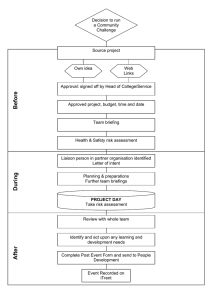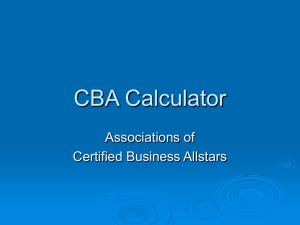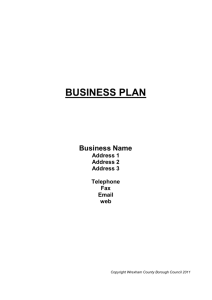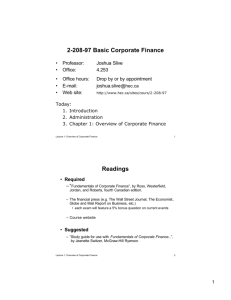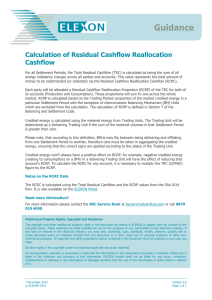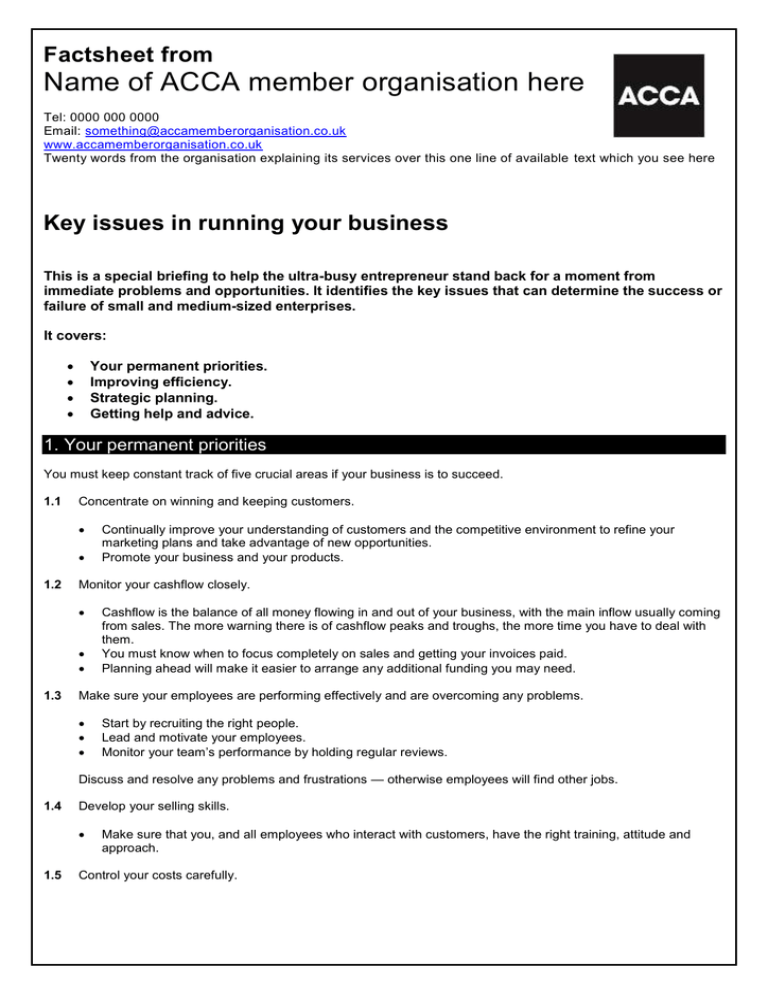
Factsheet from
Name of ACCA member organisation here
Tel: 0000 000 0000
Email: something@accamemberorganisation.co.uk
www.accamemberorganisation.co.uk
Twenty words from the organisation explaining its services over this one line of available text which you see here
Key issues in running your business
This is a special briefing to help the ultra-busy entrepreneur stand back for a moment from
immediate problems and opportunities. It identifies the key issues that can determine the success or
failure of small and medium-sized enterprises.
It covers:
Your permanent priorities.
Improving efficiency.
Strategic planning.
Getting help and advice.
1. Your permanent priorities
You must keep constant track of five crucial areas if your business is to succeed.
1.1
Concentrate on winning and keeping customers.
1.2
Monitor your cashflow closely.
1.3
Continually improve your understanding of customers and the competitive environment to refine your
marketing plans and take advantage of new opportunities.
Promote your business and your products.
Cashflow is the balance of all money flowing in and out of your business, with the main inflow usually coming
from sales. The more warning there is of cashflow peaks and troughs, the more time you have to deal with
them.
You must know when to focus completely on sales and getting your invoices paid.
Planning ahead will make it easier to arrange any additional funding you may need.
Make sure your employees are performing effectively and are overcoming any problems.
Start by recruiting the right people.
Lead and motivate your employees.
Monitor your team’s performance by holding regular reviews.
Discuss and resolve any problems and frustrations — otherwise employees will find other jobs.
1.4
Develop your selling skills.
1.5
Make sure that you, and all employees who interact with customers, have the right training, attitude and
approach.
Control your costs carefully.
This is often the easiest way to improve your short-term profitability.
2. Minimise risks
Your business will inevitably face a wide range of potential risks. But with good management, you can reduce them
significantly.
You should also put contingency plans in place to help you cope if things do go wrong.
2.1
Take out any insurances you need.
2.2
Build customer loyalty to reduce the risk of losing a key account.
2.3
Always control your cashflow (see 1.2).
2.4
Secure your premises.
Failing to act when a lease is due to expire and being caught out by large increases in rent and rates are
common problems.
Negotiate solutions to disputes if you can.
2.9
All personal information held on computers or in manual records is covered by the Act.
Major problems with your premises can be both disruptive and expensive.
2.8
Take regular back-ups so you can restore data if your system crashes.
Set up manual systems that will allow you to carry on working when PCs are down.
Make sure you comply with the Data Protection Act if you process information about other people for business
purposes.
2.7
Offer competitive remuneration and a pleasant and rewarding working environment (see 1.3).
Share knowledge and skills to avoid relying too heavily on one key employee.
Make sure your computer systems and the data stored on them are secure.
2.6
If disaster threatens, take positive steps.
Treat your employees fairly to minimise the risk of resignations.
2.5
Diversify your customer base to avoid excessive reliance on one account.
If you have to go to court, make sure you understand and follow the key steps involved.
Get advice and help if you plan to trade internationally.
Contact UK Trade & Investment (020 7215 5000).
Visit the British Chambers of Commerce Export Britain website atwww.exportbritain.org.uk.
See 6.
3. Improve efficiency
Investing time and money in training and in effective tools and systems can pay long-term dividends.
3.1
Purchase appropriate information technology to improve efficiency.
3.2
Make good use of the Internet and email.
2
3.3
Where possible, establish routines to avoid wasting time solving the same problem repeatedly.
3.4
Use the Internet to collect information and market your business.
Develop and implement straightforward policies.
Store information — including the files on your computer hard drive — systematically, so that it is easy to
find.
Manage your time efficiently, and help employees to do so. See box.
Invest in developing your employees’ skills.
4. Strategic planning
It is easy to get bogged down focusing on the short term, so you must make time for ‘big picture’ strategic activities
which will improve the overall health of your business.
4.1
Work towards long-term goals.
4.2
Focus on the key factors which determine the long-term success of the business.
Use techniques which will help you assess and improve the overall health and performance of your business.
Use a forward-looking business plan to set out how you will achieve your objectives.
Review and update the plan regularly.
4.3
Keep moving ahead.
4.4
Continually monitor key external factors which affect your business.
For example, changes to your marketplace, or what the competition is doing.
4.5
Plan for your personal long-term security.
4.6
Take care not to neglect your core activities when you are buying or selling a business.
5. Comply with legislation
Legal problems can tie up critical resources for months, or even years, and leave key parts of the business vulnerable.
5.1
Find out about the range of general laws that are likely to affect you.
Ask your advisers (see 6.2).
5.2
Comply with all employment legislation, particularly when you hire or dismiss anyone.
5.3
Provide a safe working environment.
5.4
Fulfil your duties as a director.
5.5
Otherwise you could become personally liable if your company gets into financial difficulties.
Keep accurate financial records and prepare proper accounts.
5.6
If you have five or more employees, you must have a written health and safety policy.
Unless you set up good systems on day one, this can rapidly turn into a disaster.
Make sure you meet your tax liabilities.
3
5.7
Stay on the right side of IT law.
Establish a software policy.
Using unlicensed software can hit your finances and your firm’s effectiveness.
Check how the law applies to doing business on the Internet and by email.
6. Get help and advice
6.1
Local business support organisations offer independent advice, information and a range of services to help small
businesses.
6.2
Advice may be free or subsidised.
Work with good professional advisers.
Use an accountant who understands your type of business.
Ask a solicitor who works with small businesses for a legal health check.
Find a solicitor on the Law Society website at www.lawsociety.org.uk/find-a-solicitor.
6.3
Find out what help can be offered by your trade association and local Chamber of Commerce.
6.4
Find external skills to cover any weaknesses you have.
6.5
Search the Trade Association Forum’s directory of UK trade associations at www.taforum.org.
Contact the British Chambers of Commerce (020 7654 5800 or www.britishchambers.org.uk).
Consider employing skilled consultants in areas where you cannot afford to develop in-house skills.
An experienced non-executive director can provide a regular, impartial assessment.
The Directors’ Briefing series provides concise, practical information and advice on running your business.
The Start-up Briefing series focuses on issues facing new businesses.
Organise your time
Allocate time for all the activities you need to carry out, to avoid being distracted by day-to-day issues. A typical
schedule might include:
A.
Daily tasks.
B.
Weekly tasks.
C.
Check your appointments and any correspondence.
Delegate jobs and motivate employees.
Set aside uninterrupted time for dealing with urgent tasks, and important weekly and longer-term tasks.
Check bank balances and projected cashflow position.
Review the effectiveness of your marketing.
Monthly tasks.
Review monthly business performance.
Review and modify your business plan and budgets.
Review major strategic activities.
Pay payroll and PAYE.
4
D.
Quarterly tasks.
E.
Hold employee performance appraisals.
Review overall personnel position.
Analyse the performance of major suppliers.
Complete your online VAT return and pay VAT.
Annual tasks.
Perform a SWOT analysis of overall business.
Have annual accounts prepared.
Consider whether you need to hold a company annual general meeting.
Review personal pension arrangements.
Renew insurance and other annual contracts.
Review effectiveness of major company policies.
Review the suitability of your premises.
If they are rented, make sure you know when the lease is due to expire (see 2.7).
Last updated 01.12.13
© Atom Content Marketing 2013. ISSN 1369-1996. All rights reserved. No part of this publication may be reproduced or transmitted without the
written permission of the publisher. This publication is for general guidance only. The publisher, expert contributors and distributor disclaim all liability
for any errors or omissions. Consult your local business support organisation or your professional adviser for help and advice.
5


